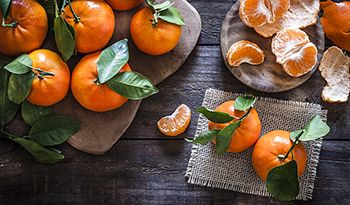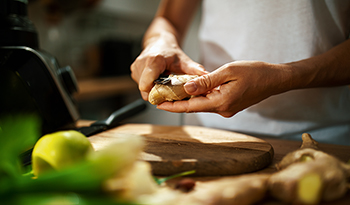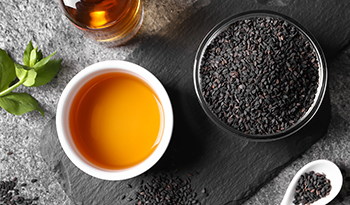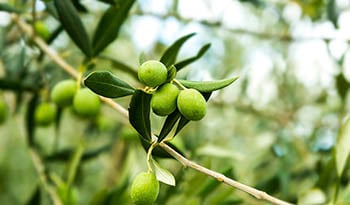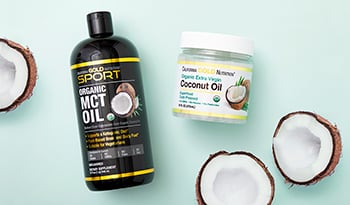12 természetes módszer a migrén fejfájás kezelésére

A migrén, amelyet gyakran fájdalmas, lüktető fejfájásként tapasztalnak, és néha hányingert és fényérzékenységet okoznak, világszerte 1 milliárd embert érint. Néhány tanulmány azt sugallja, hogy hét emberből egy -ből élete valamikor megtapasztalja ezt a súlyos fejfájást - majdnem minden ötödik nő és minden 15 férfi közül egy. Az Egyesült Államokban úgy gondolják, hogy a migrénes fejfájás kezelése évente 78 milliárd dollárba kerül az egészségügyi rendszernek.
A migrénes fejfájás az egyik fő oka annak, hogy a betegek meglátogatják elsődleges orvosukat és sürgősségi osztályokat, ahol gyakran ki vannak téve a fej CT-vizsgálata sugárzásának. Ez azonban alkalmanként szükséges annak biztosításához, hogy ne legyen vér az agyban, ami ritka oka a súlyos fejfájásnak.
Migrén oka
A migrént -et a agy„hibásan működő idegei és erek” váltják ki, amelyek nem megfelelően aktiválják a trigeminális-nyaki fájdalomrendszert. Bár tudományosan bonyolult, a migrén kezdetének megértése lehetővé teszi az orvosok számára, hogy a legjobban megelőzzék és kezeljék őket. Ezenkívül úgy tűnik, hogy - genetikai komponens - migrén fejfájás, mivel az anyák és a lányok gyakran egyaránt érintettek.
A migrénes fejfájás tünetei:
- Súlyos fejfájás, általában az egyik oldalon
- Lüktető érzés
- Hányinger
- Hányás
- Aura jelenléte, vagy cig-cakk vonalak megjelenítése
- Fényérzékenység
- Hangérzékenység
- Jelentős fogyatékosság és elmulasztott munkanapok
Ha személynél orvos diagnosztizál migrénnel, fontos , hogy próbálja meg - megtalálni a kiváltó -ot, így 26} ki legyen távolítva az étrendből, és megelőzhető a migrén.
Néhány általánosan felismert migrén kiváltója:
- Sajtok (a tiramin aminosav miatt)
- Bor (szulfitok jelenléte miatt)
- Élelmiszer adalékanyagok, például MSG és élelmiszerfesték
- fejsérülés és agyrázkódás története
- Alvás nélkülözés
- Alvási apnoe
- Krónikus stressz
- Menstruáció
- A koffein egyeseknél kiválthat, míg másokban megelőzhet
- Kiszáradás
- Mesterséges édesítőszerek, például , mint a aszpartám (NutraSweet), amelyek lényegében minden étrendben vagy nulla kalóriatartalmú szénsavas italban megtalálhatók, gyakori kiváltó tényező.
Gyógyszerészeti kezelés akut fejfájásra
A migrénes fejfájás kezelésére gyakran használt gyógyszerek a következők:
- Acetaminofen (Tylenol, Paracetamol) - Bár egyesek számára hasznosak, ezek a gyógyszerek extra stresszt okozhatnak a májraés csökkenthetik a glutationszintet, ha hosszabb ideig szedik. Ha ezt a gyógyszert szedi, javaslom a N-acetil-cisztein (NAC) kiegészítést a máj védelme érdekében.
- NSAID-ok (nem szteroid gyulladáscsökkentők) - Ibuprofen (Motrin, Advil), Naproxen (Aleve, Naprosyn), Diclofenac, Indometacin és Celecoxib (Celebrex) rövid távon hasznosak. Ezek a gyógyszerek azonban növelik a vese betegség, szívrohamok és stroke kockázatát a Szövetségi Gyógyszerügyi Hivatal (FDA) szerint, aki felügyeli a gyógyszerek biztonságosságát az Egyesült Államokban. Használja takarékosan.
- A triptánok olyan gyógyszerek csoportja, amelyeket akut módon használnak, amint a migrénes fejfájás megkezdődik. Ezek közé tartozik a szumatriptán (Imitrex), zolmitriptán (Zomig) vagy rizatriptán (Maxalt). Az érrendszeri 5-HT1 receptorok aktiválásával működnek. Az antidepresszánsokat szedőknek óvatosnak kell lenniük. Azonban nem mindenki tolerálja ezeket a gyógyszereket. Néhányan zsibbadást, kipirulást, mellkasi fájdalmat, szédülést és ritkán szívrohamot vagy stroke-ot tapasztalnak az Epocrates gyógyszeradatbázis szerint.
- Kábítószerek (kodein, tramadol, hidrokodon, morfin, oxikodon) - Általában migrénes fejfájás esetén alkalmazzák, de általában nem olyan hatékonyak, mint a triptánok. Az ópiummákból származik. A kábítószerek túlzott használata és visszaélése járvány az Egyesült Államokban, Európában, Oroszországban és Ázsiában. Rövid távú használat esetén hasznosak lehetnek. A hosszú távú használat valóban növelheti a fájdalom szintjét, és növelheti annak kockázatát, hogy egy személy leállítsa a légzést.
Az akut migrén során alkalmazott egyéb gyógyszerek közé tartoznak az émelygéscsillapító gyógyszerek, például a klórpromazin, az ondanszetron és a prometazin. A CGRP receptor antagonistákat vizsgálják, és a jövőben gyakoribbak lehetnek. Ezenkívül néha olyan ergotokat használnak, mint az ergotamin. A koffein egyesek számára is hasznos lehet.
Gyógyszerészeti gyógyszerek a migrén megelőzésére
A vényköteles gyógyszereket néha használják a migrénes fejfájás megelőzésére is. Becslések szerint a migrénben szenvedők 38 százaléka jelölt megelőző terápiára, de csak három-13 százaléka alkalmaz megelőző megközelítést. Ezek közé tartozik a propranolol, az amitriptilin (Elavil), a valproinsav és a topiramát (Topamax). Ezeknek a gyógyszereknek a hatékonysága személyenként változó.
Természetes megközelítések a migrén megelőzésére
Az megelőzés a valóban a legjobb gyógyszer, és próbál elkerülni a migrént -tól -tól kezdődő -tól kezdve, a valójában a legjobb stratégia. Általában azt javaslom pácienseimnek, hogy kipróbálják az étrend- és életmód-változtatásokat, valamint a természetes kiegészítőket, mielőtt elkezdenék a megelőzésre szolgáló gyógyszereket. A legtöbb számára ez a megközelítés hatékony.
Méregtelenítse a testét
Az elmúlt 100 évben több ezer vegyi anyagot hoztak létre a vállalatok, amelyeket vízellátásunkba, levegőbe, sőt otthoni környezetünkbe dobtak el. Sok ilyen vegyszer esetében még mindig korlátozott információkkal rendelkezünk arról, hogyan hatnak ránk. Tudjuk azonban, hogy soknak negatív egészségügyi következményei vannak, és a migrénes fejfájás is benne van. Minden ember testében mérgező vegyi anyagok vannak - ezt nem lehet teljesen elkerülni. Megpróbálhatjuk azonban minimalizálni az expozíció hosszú távú hatásait. A test méregtelenítése kulcsfontosságú a test gyógyításához. Tudjon meg többet a test méregtelenítéséről és a szivárgó bél javításáról.
Tisztítsa meg étrendjét
A feldolgozott élelmiszerek elkerülése fontos a migrénben szenvedők számára. A feldolgozott élelmiszerek olyan vegyi anyagokat tartalmaznak, amelyek idegenek az emberi test számára (xenobiotikumok), és negatív hatással vannak fiziológiánkra. Ezek közé tartoznak az élelmiszer-tartósítószerek és az élelmiszerfestékek Sok migrénben szenvedő beteg jól teljesít, ha elkerüli a tejtermékeket és gabonaféléket, beleértve a glutént -t. A migrénben szenvedők érzékenyek a kukoricára és a szójára.
A gyümölcs- és zöldségtartalmú étrend fogyasztása jó kiindulópont. Ha lehetséges, peszticid-mentes (bio) gyümölcsöket és zöldségeket kell vásárolni. Ismerkedjen meg a „Clean Thirteen” címmel, amely a hagyományosan biztonságosabb fogyasztható termékeket nevez, és a „Dirty Dozen” -vel, amely azoknak a gyümölcsöknek a listáját, amelyeket biológiailag vásárolni kell. Továbbá, ha húst fogyaszt, vásároljon fűvel táplált, antibiotikum-mentes és hormonmentes opciót. Bár ez előre drágább lehet, lehetőség van költségmegtakarításra, ha segít megelőzni a krónikus egészségi állapotot és javítja az életminőséget.
Miután megtisztította az étrendjét, megfelelő hidratálást, napi testmozgást és optimalizálta a alvást, van és néhány természetes terápia , amelyről tudományos tanulmányok hatékonynak bizonyítottak a migrénes fejfájás megelőzésében.
Kiegészítők
Az elmúlt évtizedekben tanulmányok bizonyították, hogy számos táplálékanyag hasznos a migrénes fejfájás megelőzésében. Ahogy egyre többen keresik a nem gyógyszeres megközelítéseket, a kiegészítők népszerű alternatívává váltak.
Riboflavin - Más néven B2-vitamin. Ez a vitamin hatékonynak bizonyult a migrén megelőzésében. Egy 2017-es tanulmány a Journal of Clinical Pharmacy and Therapeutics folyóiratban, amely tizenegy tanulmányt értékelt, arra a következtetésre jutott: „A riboflavin jól tolerálható, olcsó és hatékonyságot bizonyított a felnőtt betegek migrén fejfájásának gyakoriságának csökkentésében”. Egy 2014-es tanulmány kanadai családi orvos is kimutatta a riboflavin hasznosságát migrénes fejfájásban szenvedő gyermekeknél. Javasolt adag: Felnőttek - Riboflavin400 mg naponta. Gyermekgyógyászat - 100-400 mg naponta.
Magnézium - Magnéziumot ajánlottam azoknak a betegeknek, akik több mint egy évtizede migrénben szenvednek. Tapasztalatom szerint ötödik emberből négynél működik, mivel segít megelőzni a migrénes fejfájás kialakulását. A tudományos kutatás alátámasztja az orvosi tapasztalataimat. Egy 2017-es tanulmány The Journal of Head and Face Pain arra a következtetésre jutott, hogy a migrénes fejfájást magnéziummal lehet megelőzni. Más tanulmányok hasonló eredményeket mutatnak. Javasolt adag: magnézium-kelát -125 mg - 500 mg naponta - segít a migrén megelőzésében a . Kezdje alacsonyan, és szükség szerint növelje.
A gyömbér - hányinger elleni előnyökkel jár, de hasznos lehet a migrén kezelésében is. Alkalmazása megtalálható az ayurvédikus gyógyászatban. Egy 1990-es tanulmány kimutatta a gyömbér hatékonyságának ismeretét a migrén kezelésében, míg egy 2014-es tanulmány kimutatta, hogy a gyömbér ugyanolyan hatékony, mint a szumatriptán gyógyszerkészítmény migrén kezelésében. A gyömbértea fogyasztása szintén hasznos lehet a hányinger tüneteinek minimalizálásában. Javasolt adag: Gyömbér 250 mg - 500 mg naponta egyszer vagy kétszer.
Omega 3-Fish Oil - Egy 2017-es tanulmány Nutritional Neuroscience kimutatta, hogy az omega-3 halolajok segíthetnek csökkenteni a migrénes fejfájás időtartamát. Egy 2012-es tanulmány összehasonlította a halolajat és a valproinsavat és a valproinsav használatát önmagában a migrén megelőzésére. A halolaj és a valproinsav kombináció hatékonyabb volt a fejfájás megelőzésében. Végül egy 2017-es tanulmány, amelynek során az alanyok halolajat és kurkumint (kurkumát)szedtek, a migrénes fejfájás csökkenését mutatta. Javasolt adag: Omega 3-halolaj napi 2000-4000 mg. Osszuk fel napi kétszer adagolásra.
Koenzim Q10 (CoQ10) - Tanulmányok azt mutatják, hogy a CoQ10 segíthet megelőzni a migrén kialakulását. Egy 2017-es tanulmány arra a következtetésre jutott, hogy „... hogy a CoQ10 csökkentheti a fejfájás gyakoriságát, és rövidebbé teheti őket, és kevésbé súlyossá teheti őket, kedvező biztonsági profillal.” Egy másik 2017-es tanulmány és egy 2011-es tanulmány is kimutatta a CoQ10 kiegészítés előnyeit a migrén megelőzésében. Javasolt adag: Q10 koenzim 100 mg - 300 mg naponta
Alpha Lipoic Acid — A Journal of Medicinal Food 2017-es tanulmány kimutatta, hogy ez a hatékony antioxidáns , ha naponta kétszer 400 mg-os adagban veszik be, segíthet megelőzni a migrénes fejfájás gyakoriságát és időtartamát. Egy 2007-es tanulmány hasonló előnyöket mutatott. Javasolt adag: Az alfa-liponsav 600—800 mg naponta - megelőzi a migrént, rendben van, ha osztott adagokban kell bevenni.
Melatonin - A melatonin, az „alvási vitamin” hatékonynak bizonyult a migrénes fejfájás megelőzésében. Egy 2017-es tanulmány 3 mg melatonint hasonlított össze a vényköteles gyógyszerrel, valproinsavval. A melatonin hatékonyabb és mellékhatások nélkül bizonyult. Egy 2017-es tanulmány kimutatta, hogy a melatonin csökkentette a CGRP szintet és segített megelőzni a migrént. Végül a Journal of Family Practice című 2017-es tanulmány kimutatta, hogy a melatonin ugyanolyan hatékony, mint a vényköteles gyógyszer amitriptilin a migrén megelőzésében. Javasolt adag: Melatonin 3 mg - 10 mg minden éjszaka 1-2 órával lefekvés előtt.
Feverfew — Feverfew ( Tanacetum parthenium) egy évelő gyógynövény, amely jól ismert gyógyászati tulajdonságairól. Gyakran használják a migrén megelőzésére, és a tanulmányok bizonyos előnyöket mutatnak. Egy 2017-es tanulmány kimutatta, hogy a lázszár, ha magnézium és Q10 koenzimmel együtt szedve hatékony lehet a migrén megelőzésében. Javasolt adag: Feverfew 250 mg egyszer vagy kétszer naponként.
Butterbur - Ez a kiegészítő segíthet a migrén megelőzésében is. Azonban csak akkor szabad bevenni, ha pirolizidin alkaloidok (PA) mentesek, mivel ez az anyag májproblémákat okozhat. Javasolt adag: Butterbur 75 mg naponta egyszer-háromszor.
Egyéb hasznos megelőzési intézkedések
- Rendszeres aerob gyakorlat
- Jóga
- Akupunktúra
- Meditáció
- A kamilla illóolaj hasznosnak bizonyult, ha a felső ajakra alkalmazzák, vagy ha diffúzorral használják
- Levendula esszenciális hasznosnak bizonyult, ha felső ajkakra alkalmazzák vagy diffúzorral együtt
Megkönnyebbülést találhat a migréntől
A migrénes fejfájás az egyik fő oka annak, hogy az emberek elmulasztják a munkát és orvoshoz fordulnak. A becslések szerint ezek a súlyos fejfájások világszerte 1 milliárd embert érintenek. Ne feledje, hogy az egészséges táplálkozás fontos szerepet játszhat a migrén megelőzésében. A kiváltó tényezők elkerülése szintén kulcsfontosságú, és sokak számára ez magában foglalja a tejtermékeket és a glutént. A gyógyszeripari gyógyszerek is nagyon hatékonyak lehetnek, de a mellékhatásokkal kapcsolatos aggodalmak miatt az emberek alternatívákat keresnek. Szerencsére vannak lehetőségek. Sokan riboflavinnal kezdődnek első sorként. A magnézium-kelát és gyömbér hozzáadását is figyelembe kell venni. Ha e három kiegészítő használata nem elegendő, megfontolható további kiegészítők hozzáadása. Legyen türelmes, néhány hónapba telhet, mire megtalálják a megfelelő kombinációt.
Egyél egészségesen, gondolkodj egészségesen és légy egészséges.
Referenciák:
- Epocrates kábítószer-adatbázis, hozzáférés 2017. december 9-én.
- Lipton RB, Bigal ME, Diamond M és mtsai; Az amerikai migrén prevalenciájának és megelőzési tanácsadó csoportja. A migrén prevalenciája, a betegségterhek és a megelőző terápia szükségessége. Neurológia. 2007; 68:343-349.
- Silberstein, SD, Lipton, et. Al. A topiramát hatékonysága és biztonságossága krónikus migrén kezelésében: randomizált, kettős vak, placebo-kontrollos vizsgálat. Fejfájás: A fej- és arcfájdalom naplója, 47:170—180. doi: 10.1111/j.1526-4610.2006.00684.x
- Neurol Sci. 2017 május; 38 (1. kiegészítés): 117-120. doi: 10.1007/s10072-017-2901-1.
- Thompson DF, Saluja HS. A migrénes fejfájás megelőzése riboflavinnal: Szisztematikus áttekintés. J Clin Pharm Ther. 2017; 42:394 —403. https://doi.org/10.1111/jcpt.12548
- Sherwood M, Goldman RD. A riboflavin hatékonysága a gyermekkori migrén megelőzésében. Kanadai családorvos. 2014; 60 (3): 244-246.
- J Ethnopharmacol. 1990 július; 29 (3): 267-73.
- Maghbooli, M., Golipour, F., Moghimi Esfandabadi, A. és Yousefi, M. (2014), A gyömbér és a szumatriptán hatékonyságának összehasonlítása a gyakori migrén ablatív kezelésében. Fitotéter. Re., 28:412—415. doi: 10.1002/ptr.4996
- Az omega-3 zsírsavak hatása a migrénes rohamok gyakoriságára, súlyosságára és időtartamára: A randomizált kontrollált vizsgálatok szisztematikus áttekintése és metaanalízise Leila Maghsoumi-Norouzabad, Anahita Mansoori, Reza Abed & Farideh Shishehbor Nutritional Neuroscience Vol. 0, Iss. 0,0
- Tajmirriahi M, Sohelipour M, Basiri K, Shaygannejad V, Ghorbani A, Saadatnia M. A nátrium-valproát hatása halolaj-kiegészítéssel vagy önmagában a migrénmegelőzésben: randomizált egyvak klinikai vizsgálat. Iráni Neurológiai Folyóirat. 2012; 11 (1): 21-24.
- Immunogenetika. 2017 június; 69 (6): 371-378. doi: 10.1007/s00251-017-0992-8. Epub 2017 május 6.
- Acta Neurol Belg. 2017 márc.; 117 (1) :103-109. doi: 10.1007/s13760-016-0697-z. Epub 2016 szeptember 26.
- Neurol Sci. 2017 május; 38 (1. kiegészítés): 117-120. doi: 10.1007/s10072-017-2901-1.
- Cephalalgia. 2011 június; 31 (8) :897-905. doi: 10.1177/0333102411406755. Epub 2011 május 17.
- Cavestro Cinzia, Bedogni Giorgio, Molinari Filippo, Mandrino Silvia, Rota Eugenia és Frigeri Maria Cristina. A gyógyászati élelmiszerek folyóirata. 2017. október, nyomtatás előtt. https://doi.org/10.1089/jmf.2017.0068
- Fejfájás. 2007 január; 47 (1): 52-7. (Tanulmány, amely szerint az alfa-liponsav segíthet megelőzni a migrént)
- Neurol Neurosci Restor. 2017; 35 (4) :385-393. doi: 10.3233/RNN-160704. (Melatonin vs valproinsav)
- Acta Neurol Belg. 2017 szeptember; 117 (3) :677-685. doi: 10.1007/s13760-017-0803-x. Epub 2017 június 5.
- Lyon C, Langner S., Stevermer J. PURLs: Fontolja meg a melatonint a migrén megelőzésében. A családi gyakorlat folyóirata. 2017; 66 (5): 320-322.
- Cochrane Database System Rev. 2015 április 20.; 4: CD002286. [Epub nyomtatás előtt]
- BMC Complement Altern Med. 2017 augusztus 30; 17 (1): 433. doi: 10.1186/s12906-017-1933-7.
- Med Hypotézisek. 2014 november; 83 (5): 566-9. doi: 10.1016/j.mehy.2014.08.023. Epub 2014 szeptember 6. (Kamilla illóolaj és migrén)
- Eur Neurol. 2012; 67 (5) :288-91. doi: 10.1159/000335249. Epub 2012 április 17. (Levendula illóolaj migrénre)
FELELŐSSÉGKIZÁRÓ NYILATKOZAT:A jelen blognak nem célja diagnózis felállítása...
















































































 Tartalomjegyzék
Tartalomjegyzék




